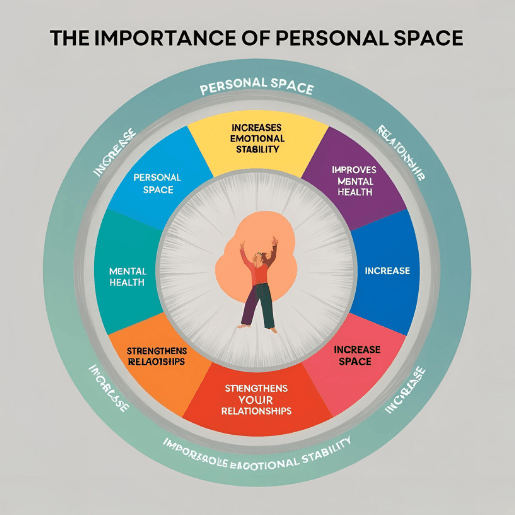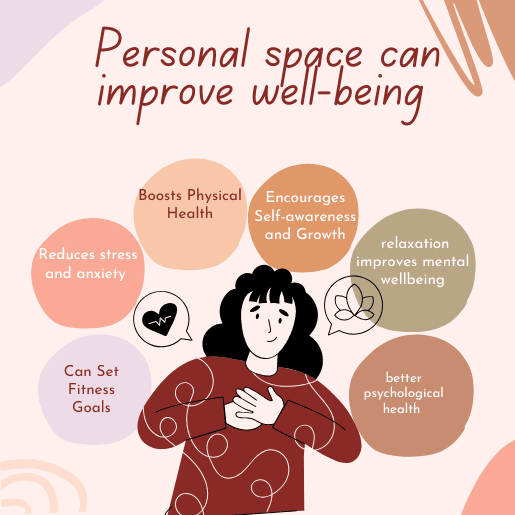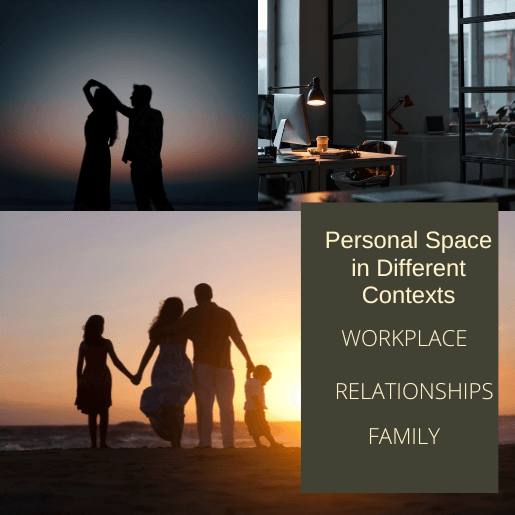In our fast-paced society, where continual connectedness impacts our everyday interactions, the desire for personal space has become increasingly important. But what is personal space, and why is it so important? Personal space refers to the physical and emotional boundaries that people want to establish around themselves. These hidden boundaries protect us from stress, worry, and emotional tiredness. This essay will discuss the importance of personal space and how it influences mental health, relationships, productivity, and overall well-being.
The desire for personal space has become increasingly important in our fast-paced society, where continual connectedness impacts our everyday interactions.
Definition of Personal Space
Personal space is more than simply physical distance; it also signifies a psychological comfort zone. Personal space requirements vary depending on an individual’s personality, cultural background, upbringing, and previous experiences. Recognising and respecting personal space is critical for maintaining healthy interpersonal interactions and emotional well-being.
The Importance of Personal Space

1.Increases Emotional Stability
Having enough personal space allows people to relax and efficiently process their emotions. Constant connection without breaks can cause emotional overload, increasing vulnerability to anxiety, irritation, and melancholy. Time alone provides the mental clarity required for navigating complex emotions and maintaining emotional equilibrium.
2.Improves Mental Health
Personal space is vital for mental health. According to psychological research, insufficient personal space is strongly linked to increased stress, anxiety disorders, and even burnout. Spending time alone on a regular basis reduces stress hormones and increases emotional resilience, allowing us to keep a better mentality.
3.Strengthens relationships
Contrary to popular belief, maintaining personal space strengthens rather than weakens relationships. When people respect each other’s limits, they develop mutual respect and trust. Personal space reduces disagreements and avoidable disputes, promoting healthier relationships.
4.Increases productivity and creativity
Individuals who have personal space can engage in uninterrupted pondering. This seclusion encourages creativity and increases productivity. Writers, artists, and inventors frequently attribute their greatest accomplishments to time alone, emphasising the value of personal space in both creative and professional settings.
Personal Space Can Improve Well-Being

Reduces stress and anxiety
Personal space provides individuals with a fundamental sense of control and independence in their surroundings, which significantly reduces stress and anxiety levels. Psychologists emphasise the need of personal liberty in properly managing anxiety disorders, as feeling caged or overly monitored can exacerbate tension and stress. Those who regularly have appropriate personal space report a significant reduction in stress-related symptoms, as well as improved levels of life satisfaction and emotional well-being. Ensuring adequate personal space creates an environment in which people feel safe and at peace, resulting in better psychological health and general wellness.
Boosts Physical Health
Psychological stress has a wide range of impacts, including physical problems. Ongoing stress from regular interpersonal encounters without adequate personal space can cause a variety of health issues, including tension headaches, decreased immunological responses, and an increased risk of cardiovascular disease. Adequate personal space allows individuals to rest, unwind, and rejuvenate, greatly reducing physiological stress responses. This relaxation improves mental wellbeing and has a direct impact on physical health, encouraging a stronger immune system, fewer diseases, and higher long-term vitality.
Encourages Self-awareness and Growth
Allocating time for personal space provides essential opportunities for introspection and self-reflection, enabling individuals to cultivate deeper self-awareness. By regularly spending time alone, people can more clearly understand their personal thoughts, emotions, and reactions, thereby fostering significant emotional and intellectual growth. Personal space acts as a catalyst for self-improvement, allowing individuals to recognize and address their strengths and weaknesses thoughtfully and constructively. This ongoing process of reflection and development ultimately leads to a more fulfilling, meaningful, and enriched life experience, enhancing personal relationships, career growth, and overall life satisfaction.
Personal Space in Different Contexts

Workplace
In professional environments, personal space is integral to employee well-being and organizational success. While open-office layouts have gained popularity for promoting collaboration, they can inadvertently compromise employee comfort and productivity by neglecting individual privacy needs. Constant interruptions, noise distractions, and reduced privacy can lead to stress, decreased morale, and lower productivity levels.
Companies that prioritize personal space through thoughtful office design, incorporating private workstations, quiet areas, or flexible remote working options, tend to benefit significantly. Employees in these environments report greater satisfaction, heightened concentration, and enhanced creativity. Additionally, providing ample personal space reduces workplace stress, helping decrease absenteeism, lower turnover rates.
By strategically designing spaces that accommodate different working styles—including collaborative spaces, private cubicles, and quiet zones—businesses not only cater to diverse employee needs but also create environments that promote psychological safety, job satisfaction, and sustained organizational growth.
Relationships
In romantic relationships and friendships, personal space serves as a cornerstone for long-term emotional intimacy and stability. Maintaining individuality within relationships through dedicated personal time allows individuals to pursue personal interests, hobbies, or self-care activities, thereby enhancing their sense of self-worth and happiness.
Couples and friends who establish clear boundaries for personal space typically experience deeper trust, greater mutual respect, and increased emotional closeness. The ability to step back and engage independently prevents relationship burnout, reduces the likelihood of conflicts arising from dependency or suffocation, and promotes healthier emotional attachments.
Cultivating personal space within relationships also facilitates better communication. Individuals who feel secure in their autonomy tend to communicate more openly, honestly, and effectively about their needs, desires, and boundaries, fostering stronger bonds and higher relationship satisfaction.
Family
Within family dynamics, personal space significantly contributes to harmonious interactions and emotional development. Families that consciously acknowledge and respect personal boundaries create supportive environments where each member feels valued, understood, and secure.
Respecting personal space in family settings entails recognizing individual preferences, providing privacy when needed, and fostering an atmosphere where members can comfortably express their emotional and physical boundary needs without fear of judgment or backlash. This approach reduces conflicts and misunderstandings, facilitating healthier family relationships.
Teaching children about the importance of personal space and boundaries from a young age encourages emotional intelligence, independence, and resilience. Children raised in environments that respect their personal space tend to grow up with better interpersonal skills, higher self-esteem, and a greater ability to navigate social relationships effectively.
Moreover, modelling respect for personal space within the family fosters a culture of mutual respect and empathy, strengthening familial bonds and promoting emotional wellness across generations.
Practical Ways to Maintain Personal Space
Practical Approaches to Upholding Personal Space

Communicating Effectively
Effective communication is crucial for successfully maintaining personal space. It’s important to express your personal boundaries clearly to friends, family, coworkers, and anyone else with whom you frequently interact. When you share your needs openly and honestly, it helps others understand your emotional and psychological comfort levels. Providing specific examples or situations where your boundaries were honored or violated can further clarify your position. Moreover, periodically reiterating these boundaries aids in sustaining ongoing respect and awareness among those around you.
Schedule time for yourself
Making time for yourself is critical for preserving emotional health and psychological well-being. Setting aside time for isolation, whether daily or monthly, provides an opportunity to refresh and acquire insight. Simple activities such as taking a quiet walk in nature, leisurely reading, writing your thoughts, or practicing meditation can give tremendous advantages. Such activities provide restorative experiences that refill emotional resources, reduce stress, and promote mental clarity. Consistently scheduling alone time helps to create a viable personal space routine.
Define physical boundaries
Setting defined physical boundaries at work or home can significantly increase your sense of personal space. Assigning distinct locations, such as a separate office, a reading corner, a meditation zone, or simply a cosy seat in your living room, creates a sanctuary where you may escape external stressors. Clearly identifying these places as yours emphasises their function and discourages unwanted intrusions and disturbances. These physical boundaries can gradually transform into psychological ones, supporting a healthy emotional and mental state by communicating clear limits and expectations to others.
Control Digital Interactions
Regulating digital communications is critical to maintaining your personal space. Excessive social media use, constant messaging, and ongoing digital connections can cause emotional exhaustion and reduce your ability to enjoy genuine quiet and reflection. Setting strict screen time limits, implementing digital detox tactics such as blocking alerts or devoting particular hours to unplug, and engaging in offline activities can all significantly improve your emotional and psychological well-being. Reducing your dependency on technology allows for more true self-reflection, promotes mindfulness, and aids in the maintenance of stronger connections with yourself and those around you.
Barriers to Personal Space

Personal space, while valued by all, has unique challenges in different contexts and places. While most people naturally want to maintain their comfort zones, practical restrictions, cultural differences, and technological improvements frequently disturb these conventions. Failure to regularly respect these limits can lead to discomfort, tension, and social misunderstandings, affecting relationships and personal well-being.
Overcrowded environments and personal boundaries
Busy public areas, such as subways, elevators, festivals, and crowded markets, frequently challenge people’s personal space preferences. In such densely packed areas, maintaining preferred boundaries becomes practically difficult, causing individuals to feel stressed, anxious, or frustrated. For individuals, prolonged exposure to these situations can cause discomfort or even social withdrawal. Recognising that these intrusions are frequently unavoidable might help people develop coping strategies, such as mindfulness techniques or regular breaks to restore personal comfort.
Cultural Misinterpretation and Personal Space
Cultural differences have an important influence in personal space miscommunications. Closeness, for example, may be perceived as extremely intrusive or insulting by someone from a Western, individualist culture. In contrast, someone from a collectivist culture may regard keeping a substantial distance as cold or unpleasant. These discrepancies frequently result in unintended offences or strained relationships during cross-cultural interactions. Raising awareness of cultural differences and making a concerted effort to comprehend others’ comfort zones can considerably promote mutual respect and harmony.
Technology and Digital Intrusions into Personal Space
Technological improvements and digital communication present new challenges to personal space limits. Interactions on social media, video calls, or messaging services can blur the distinction between the private and public spheres. Uninvited texts, unexpected video calls, and improper personal queries can all feel intrusive or uncomfortable, even in online settings. It is becoming increasingly important to create clear online boundaries and convey personal comfort levels in order to sustain polite interactions and protect individual privacy in our interconnected digital age.
Addressing these challenges requires purposeful efforts, such as proactive boundary setting, mindful technology use, and intentional lifestyle modifications.
Personal space is not a luxury, but rather an absolute necessity for maintaining mental, emotional, and physical wellness. Recognising and prioritising personal limits increases productivity, promotes healthier relationships, and improves overall well-being. Understanding and respecting personal space allows us to create more resilient and balanced lifestyles that can thrive in the face of life’s many obstacles.

